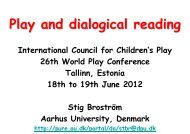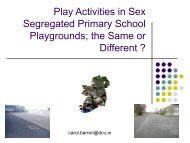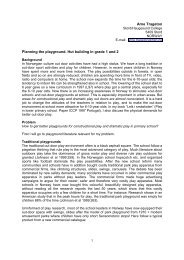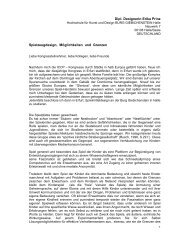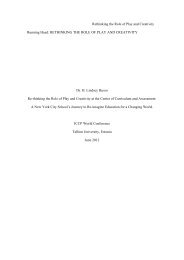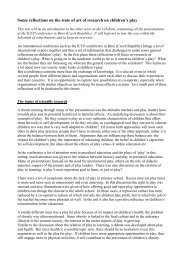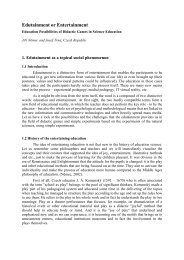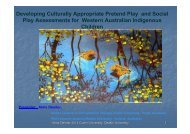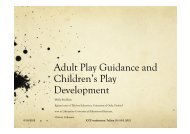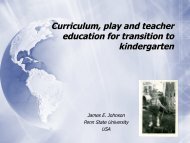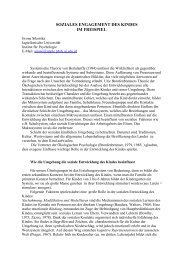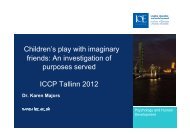23. ICCP - International Council for Children's Play
23. ICCP - International Council for Children's Play
23. ICCP - International Council for Children's Play
You also want an ePaper? Increase the reach of your titles
YUMPU automatically turns print PDFs into web optimized ePapers that Google loves.
8<br />
The project group were most interested in old games – specially the <strong>for</strong>gotten one. We<br />
wanted to use the students to collect games from their parents, grandparents or elderly<br />
people back home – in addition to their own games. When this games passes on to the next<br />
generation – it becomes traditional games.<br />
3.2 Categorising<br />
What type of categorising could we use? Opie & Opie (1969) studied children`s play in<br />
streets and playground. They classified their material in following categories (rule games):<br />
“Chasing - catching - seeking - hunting, racing - dulling - guessing - acting and pretending<br />
games. Sutton-Smith (1971) studies from 1959 is a classic in these area with all his research<br />
on analysing and categorising children`s games. Sutton-Smith & Rosenborg are in an article<br />
“Sixty Years of Historical Change in the Games Preferences of American Children”<br />
presenting a detailed list of categories (Herron & Sutton-Smith 1985). The most interesting<br />
is the tree head groups of games Roberts & Sutton Smith (1971) suggested:<br />
* Games of physical skills<br />
* Games of strategy<br />
* Games of chance<br />
A Swedish researcher, Forsgård (1987), use much the same methods <strong>for</strong> her categorising as<br />
Opie and Sutton-Smith. She categories the games after what`s happening: “<strong>Play</strong> in snow<br />
with equipment - <strong>Play</strong> in snow without equipment - Weather games - Games in the sand -<br />
Ball games - Hunting games - Games with equipment - Finger games - Jumping games -<br />
Games without equipment - Role games and other games”. In this list we do not find only<br />
rule games, but also construction games and role games.<br />
In Norway very little has been done on the field of traditional games – rule game, except<br />
from Enerstvedt`s work. She tries to give us an understanding of Norwegian play-tradition,<br />
based on historical sources and on observation in her books “Kongen over gata” (1971) and<br />
“Tampen brenn” (1982). Enerstvedt categories in: “ Ballgames - Sports games - Catching<br />
games -Hiding games - Imitations-/hide-/catching games - <strong>Play</strong> with plants and other nature<br />
material - Singing games - Circle games and couple games - Blind man, trick games and<br />
other party games and play”.



